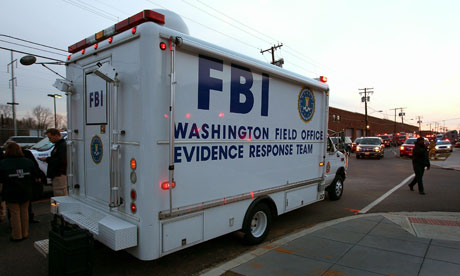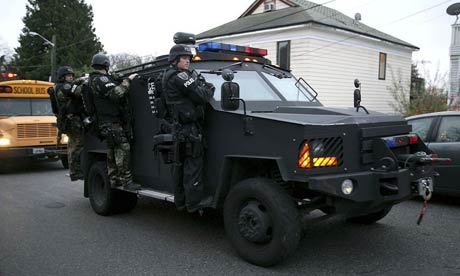guardian.co.uk
by Jennifer Abel
Image: Seattle police department Swat team officers. The Patriot Act, soon to be extended, overrides the constitutional rule that federal authorities must prove 'probable cause' before being permitted to search citizens' private property. Photograph: Marcus Donner/Reuters.
by Jennifer Abel
Image: Seattle police department Swat team officers. The Patriot Act, soon to be extended, overrides the constitutional rule that federal authorities must prove 'probable cause' before being permitted to search citizens' private property. Photograph: Marcus Donner/Reuters.
Of course, the constitution as it's written makes drug laws difficult to enforce. Police learn about most crimes – real crimes – when the victims report them to the police. But there's no victim to complain when a willing buyer purchases a product from a willing seller, so drug cops looking to make arrests and justify their existence had to resort to privacy violations and fishing expeditions instead.
Then came the terrorist attacks of 11 September 2001, the most horrific in my country's history. But it was also the answer to every drug warrior's prayers: they finally got the unconstitutional powers they craved, and under a spiffy patriotic acronym to boot. The Patriot Act passed six weeks later and, as the ACLU noted:
"Most of the changes to surveillance law made by the Patriot Act were part of a longstanding law enforcement wishlist that had been previously rejected by Congress, in some cases repeatedly."No surprise, then, when a department of justice official testifying before Congress in 2009 admitted that Patriot Act provisions were overwhelmingly used to go after drug dealers rather than terrorists. The constitution's fourth amendment protects people and their property against "unreasonable search and seizure" without "probable cause". The Patriot Act tossed the probable cause provision out the window. Now, if government agents want to read your mail, listen to your phone conversations, comb through your financial records or worse, they don't need evidence or a search warrant; they need only say, "It's for a terrorism investigation."
Though most of the Patriot Act was passed as a permanent law, some provisions had sunset clauses slated to expire in 2005. So far, every time an expiration date has drawn near, Congress has voted for an extension. The last extension, good for 90 days, passed in February. Now that those 90 days are almost up, it looks like Congress is gearing up for another extension – this one to last four years. The Associated Press reported:
"The deal between Senate majority leader Harry Reid and House speaker John Boehner calls for a vote before 27 May, when parts of the current act expire. The idea is to pass the extension with as little debate as possible to avoid a protracted and familiar argument over the expanded power the law gives to the government."The desire to avoid debate is sadly typical these days. As an American, I've always heard that congressmen and women and presidents are my "elected representatives", though their behaviour of late suggests most think their job is to rule the populace rather than represent it. Debate, after all, requires the consideration of opinions other than your own, and sometimes even compromise; such things are part of a representative's job description, but beneath a ruler's dignity.
A few months before Bin Laden died, Pew Research did a survey showing he and al-Qaida had already lost most of their support throughout the Muslim world. So, with Bin Laden dead and his organisation toothless and despised by its own former power base, why not repeal the Patriot Act and return to the constitutional standards of 10 September 2001?
Oh, right: won't happen because the Patriot Act was never about Bin Laden in the first place.
From Bush to Obama, the snooping goes on
By Dan Kennedy
The Patriot Act's section 215 – just renewed by Congress – permits almost unlimited powers of surveillance of US citizens

The section 215 provision of the newly-extended Patriot Act gives the government extensive powers, which Democratic senators suggest is being used far beyond any legitimate anti-terror purpose. Photograph: Win Mcnamee/Getty Images
It was a notorious provision of the USA Patriot Act, renewed on Thursday, that allowed the government to snoop on what library books you'd borrowed, what videos you'd rented, your medical records – anything, really, if investigators thought it might have something to do with terrorism, no matter how tangential.
I wrote about it for the Boston Phoenix in 2003, as an example of the then budding excesses of the Bush-Cheney years.
Well, section 215 is back – not that it ever went away. Charlie Savage reports in Friday's New York Times that two Democratic senators, Ron Wyden of Oregon and Mark Udall of Colorado, have accused the Obama administration of using Section 215 for purposes not intended by Congress. Russ Feingold, then a Democratic senator for Wisconsin, raised similar alarms in 2009.
The senators know what the White House is up to because they were privy to secret testimony. But under Senate rules, they can't reveal what they learned. Thus they have demanded that the White House come clean with the public. "Americans would be alarmed if they knew how this law is being carried out," Udall is quoted as saying.
Julian Sanchez of the Cato Institute recently described section 215 in an interview with Salon, so:
"It allows investigators to get an order from the FISA court permitting them to compel the production of any tangible thing that is relevant to an investigation. It's pretty unlimited in scope. Any record or other thing that pertains to a suspected agent of a foreign power or someone in contact with them is under the law considered to be 'presumptively relevant'. That means the judge has no discretion to deny such requests. The records don't have to belong to anyone who is thought to be guilty of anything."FISA, you may recall, is the Foreign Intelligence Surveillance Act. At the height of the Bush years, the White House didn't even bother with the niceties of going to a FISA court before ordering wiretaps. But as Sanchez notes, the FISA provision isn't much more than a figleaf, anyway.
Which reminds me: the Obama justice department recently issued a subpoena ordering James Risen, one of the New York Times reporters who broke the story about the Bush administration's secret wiretaps, to reveal his confidential sources.
President Obama's approach to civil liberties has been similar to that of his predecessors: for them, when convenient; against them, when upholding our rights would interfere with his exercise of untrammelled executive power. Last year, ACLU executive director Anthony Romero pronounced himself "disgusted" with Obama's civil rights record.
George W Bush and Dick Cheney remain outliers because of their embrace of torture, secret rendition and the like. Otherwise, though, Obama fits into a long pattern of presidents whose actions on civil liberties are very different from their pious words.

No comments:
Post a Comment
I want to hear from you but any comment that advocates violence, illegal activity or that contains advertisements that do not promote activism or awareness, will be deleted.